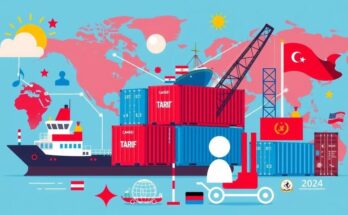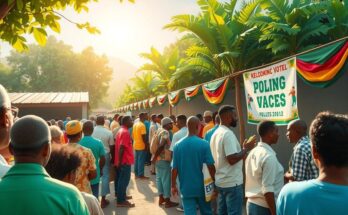Romania’s recent presidential election witnessed unexpected results when far-right candidate Calin Georgescu secured a significant portion of votes, aided by Russian manipulation via social media. The Romanian government responded by annulling the election results due to extensive interference. This incident underscores the challenges democracies face against foreign meddling and emphasizes the need for vigilant election monitoring and regulation.
Romania’s recent presidential election revealed significant vulnerabilities in its political landscape, notably when Calin Georgescu, an previously unidentified far-right candidate, surprisingly led in the first round of voting. This unexpected outcome drew considerable attention, particularly as it was later uncovered that Russian interference played a crucial role in boosting Georgescu’s popularity. Utilizing a sophisticated online campaign across social media platforms, particularly TikTok, Russia manipulated the digital environment with artificial intelligence and fake accounts to distort public sentiment in its favor.
The backdrop of this situation underscores Romania’s position within a broader context of European political dynamics, where far-right sentiments have been gaining traction. Despite Romania’s status as a reliable NATO ally and a long-standing member of the European Union, Georgescu’s surging support indicated a concerning shift towards nationalism and anti-EU rhetoric. This incident exemplifies how external powers, notably Russia, exploit political dissatisfaction to influence election outcomes in democratic societies.
Amidst rising concerns over the integrity of elections worldwide, Romania’s Constitutional Court ruled to annul the election results due to the significant external manipulation detected, challenging the legitimacy of the voting process. Intelligence reports indicating the scale of Russian interference prompted the president to act decisively, revealing the intricate methods employed by foreign actors to undermine democratic processes. This case illustrates the increasingly sophisticated nature of electoral interference and the necessity for robust countermeasures to protect democratic integrity.
The implications of such interference extend beyond immediate electoral outcomes. They reflect a broader struggle faced by democracies regarding foreign influence in local affairs and the challenge of combating misinformation. As countries like Romania navigate these threats, they must engage in proactive measures, including enhancing regulations around social media and establishing transparent electoral processes, to mitigate the risks of external manipulation. The ongoing challenge remains: how to effectively deter foreign involvement while rebuilding trust in the democratic process.
The context surrounding Romania’s presidential election is set against a backdrop of increasing far-right movement across Europe, which has seen candidates with anti-EU sentiments gaining traction. Romania, positioned close to Ukraine and heavily reliant upon NATO alliances, appears susceptible to the influence of external actors, particularly Russia, which has a well-documented history of meddling in democratic processes internationally. The rise of disinformation and strategic campaigning through social media highlights the urgent need for protective measures in democratic societies.
In conclusion, the Romanian presidential election serves as a striking example of how foreign interference can shape political outcomes within sovereign nations. By unveiling the tactics employed by Russia to manipulate public perception, Romania has highlighted a crucial need for electoral security across democracies. This incident calls for countries to establish stronger defenses against digital misinformation and to strive for increased resilience in their election processes, ensuring the integrity of their democratic institutions. The lessons drawn from this experience may resonate throughout Europe and beyond as challenges persist in the face of evolving electoral threats.
Original Source: www.hawaiitribune-herald.com




